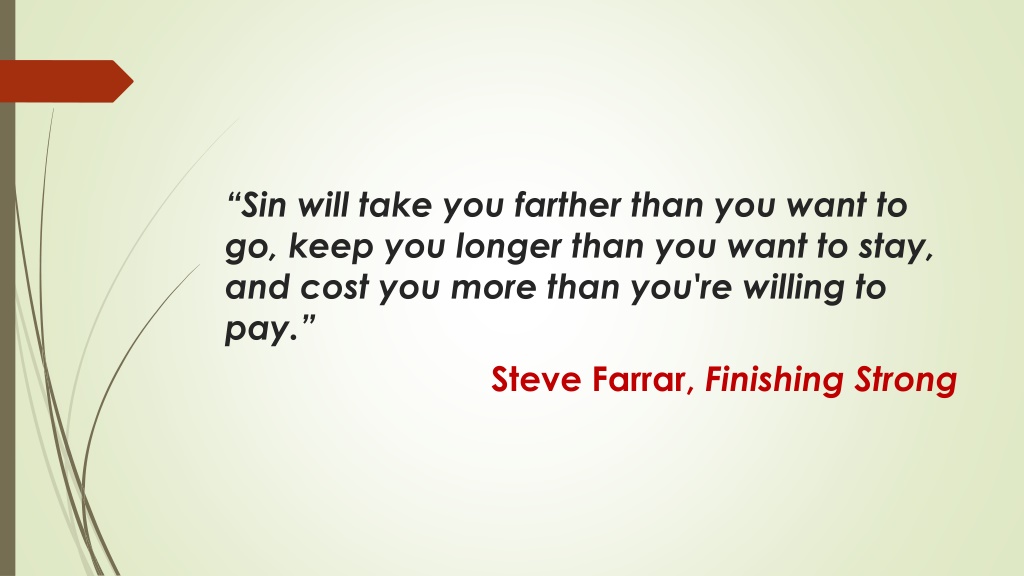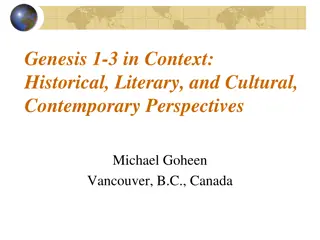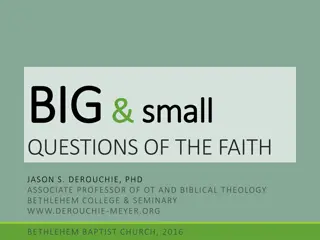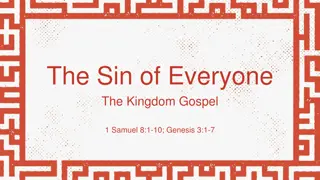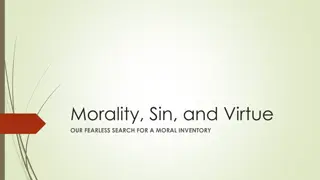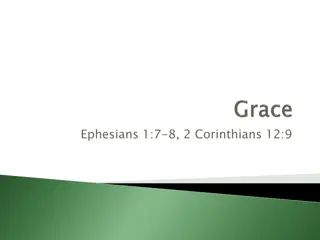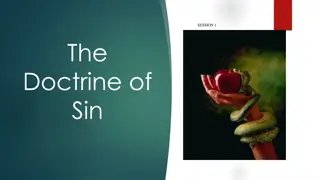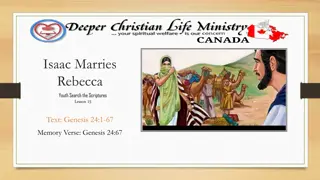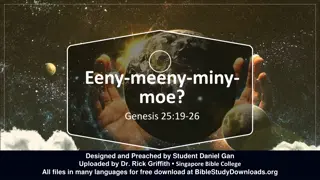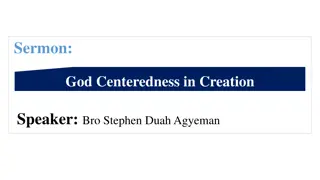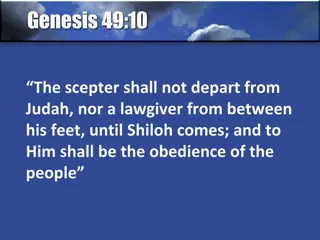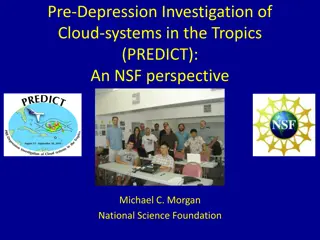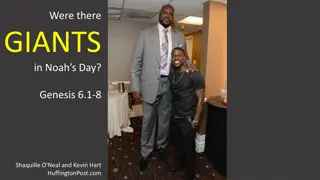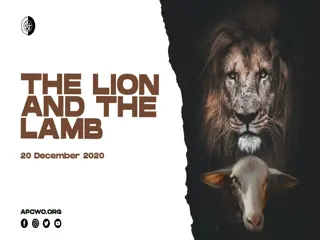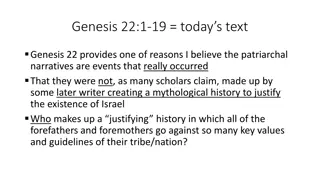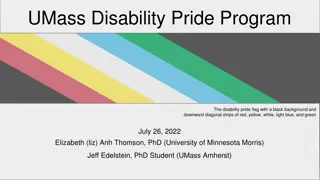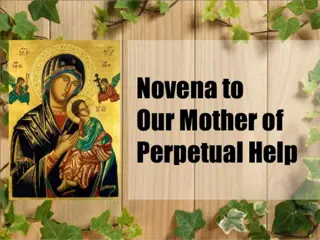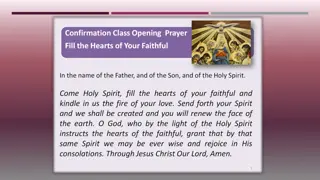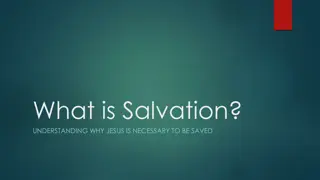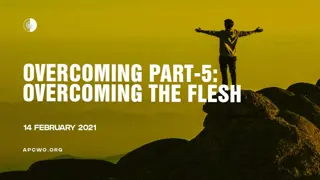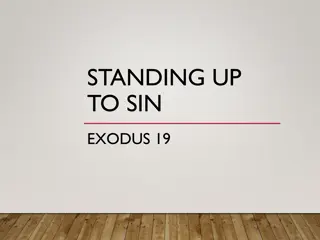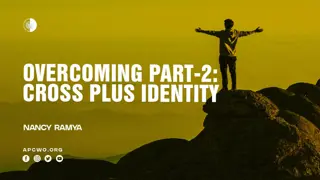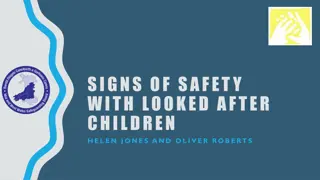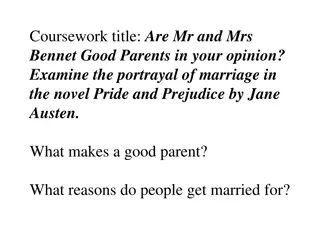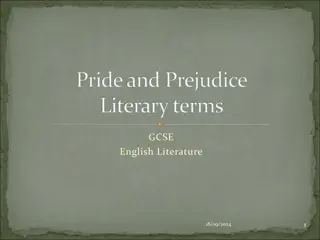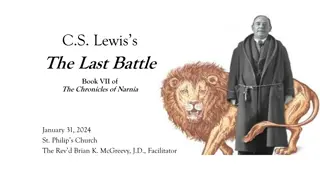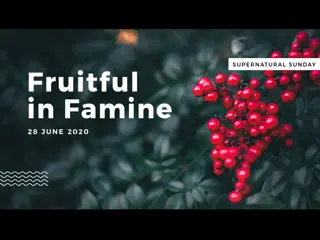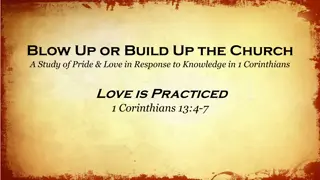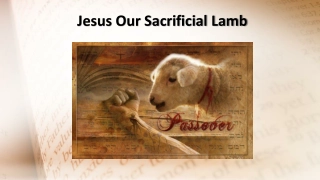The Danger of Sin and Pride in the Genesis Story
Sin leads one farther than intended, keeps one longer than desired, and costs more than anticipated. The Genesis narrative depicts God's plan for intimate relationship with humanity, marred by man's response of succumbing to the temptation of independence, as seen in the distortion of God's command by Eve. Pride precedes downfall in a cycle that challenges the obedience and dependence on God intended for mankind.
Download Presentation

Please find below an Image/Link to download the presentation.
The content on the website is provided AS IS for your information and personal use only. It may not be sold, licensed, or shared on other websites without obtaining consent from the author. Download presentation by click this link. If you encounter any issues during the download, it is possible that the publisher has removed the file from their server.
E N D
Presentation Transcript
Sin will take you farther than you want to go, keep you longer than you want to stay, and cost you more than you're willing to pay. Steve Farrar, Finishing Strong
Pride Comes Before the Fall Genesis 3:1-19 God s plan for man Man s response The consequences God s gracious response
I. Gods plan for man: life in intimate relationship with his creator God, being fully dependent upon Him and obedient to Him From Genesis 2 All this is given with one condition as we see in 2:16-17: And the LORD God commanded the man, saying, You may surely eat of every tree of the garden, but of the tree of the knowledge of good and evil you shall not eat, for in the day that you eat of it you shall surely die.
II.The response of man: to succumb to the temptation of independence A.The Serpent s proposition of independence (verses 1-5) 1.He strikes up a conversation by questioning God s command (1) What Satan said: You shall not eat of any tree in the garden What God actually said: You may surely eat of every tree of the garden except the tree of the knowledge of good and evil.
II.The response of man: to succumb to the temptation of independence A.The Serpent s proposition of independence (verses 1-5) 1. He strikes up a conversation by questioning God s command (1) 2. He reveals how Eve has distorted God s command (2-3)
Eves 3-Fold Distortion of Gods Command in 3:2-3 What God said in 2:16-17: You may surely eat of every tree of the garden, but of the tree of the knowledge of good and evil you shall not eat, for in the day that you eat of it you shall surely die. What Eve says in 3:2-3: We may eat of the fruit of the trees in the garden, but God said, You shall not eat of the fruit of the tree that is in the midst of the garden, neither shall you touch it, lest you die.
Eves 3-Fold Distortion of Gods Command in 3:2-3 What God said in 2:16-17: You may surely eat of every tree of the garden, but of the tree of the knowledge of good and evil you shall not eat, for in the day that you eat of it you shall surely die. What Eve says in 3:2-3: We may eat of the fruit of the trees in the garden, but God said, You shall not eat of the fruit of the tree that is in the midst of the garden, neither shall you touch it, lest you die.
Eves 3-Fold Distortion of Gods Command in 3:2-3 What God said in 2:16-17: You may surely eat of every tree of the garden, but of the tree of the knowledge of good and evil you shall not eat, for in the day that you eat of it you shall surely die. What Eve says in 3:2-3: We may eat of the fruit of the trees in the garden, but God said, You shall not eat of the fruit of the tree that is in the midst of the garden, neither shall you touch it, lest you die.
II.The response of man: to succumb to the temptation of independence A.The Serpent s proposition of independence (verses 1-5) 1. He strikes up a conversation by questioning God s command (1) 2. He reveals how Eve has distorted God s command (2-3) 3. He denies the consequences of disobeying God s command (4) 4. He attributes false motives to God in giving His command (5)
II.The response of man: to succumb to the temptation of independence A.The Serpent s proposition of independence (verses 1-5) B.Eve succumbs to the temptation and enlists her husband in the act (Verse 6) C.Despite what the Serpent promises, the man and woman suffer the consequences of their desire for independence (Verse 7)
III. The ultimate consequence for man: the 5 calamities of the Fall A.Creation was subjected to a curse of futility (Verses 17-18 & Romans 8:20-21) For the creation was subjected to futility, not willingly, but because of Him who subjected it, in hope that the creation itself will be set free from its bondage to corruption Romans 8:20-21
III. The ultimate consequence for man: the 5 calamities of the Fall A.Creation was subjected to a curse of futility (Verses 17-18 & Romans 8:20-21) B. Man s relationship with creation became dominated by pain and toil (Verses 17-19) C. Man s relationship with one another became dominated by adversity (Verses 12-13, 16-17) To the woman He said, I will surely multiply your pain in childbearing; in pain you shall bring forth children. Your desire shall be contrary to your husband, but he shall rule over you. (Verse 16, ESV)
III. The ultimate consequence for man: the 5 calamities of the Fall A.Creation was subjected to a curse of futility (Verses 17-18 & Romans 8:20-21) B. Man s relationship with creation became dominated by pain and toil (Verses 17-19) C. Man s relationship with one another became dominated by adversity (Verses 12-13, 16-17) D. Man s relationship with himself was broken (Verses 10,16) E. Man s relationship with God was broken and, therefore, life was lost (Verses 8-11, 19, 22-24)
IV. The response of God: the plan to fight, and ultimately win, the battle for our redemption Genesis 3:14-15
Pride Pride Comes Comes Before the Before the Fall Fall
